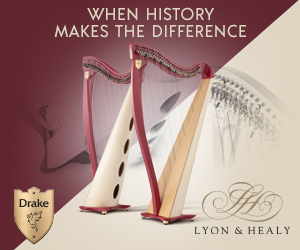Home › Forums › Teaching the Harp › students and their choices
- This topic has 4 replies, 2 voices, and was last updated 18 years ago by
unknown-user.
-
AuthorPosts
-
April 4, 2006 at 2:27 am #88668
unknown-user
ParticipantI was reminded of my experiences as a student recently. I sometimes had difficulty choosing repertoire, as there were so many pieces and I wanted to know all of them, and I didn’t fully appreciate when I played one well perhaps, so I moved on to something new, or I just didn’t think they were suitable to a degree recital, and so on. I was helped by a guest teacher who helped me whittle down my choices by saying which ones were ready, and what was enough. But what I remember particularly was the willingness of Lucile Lawrence to let me try something big, something very challenging, something a big leap ahead rather than a baby step forward. I learned from such repertoire, and developed my technique, but also my comprehension, which would have been held back otherwise, and I might never have developed the courage to tackle big projects, or the confidence to conquer them. I didn’t always get to the finish line, but I ran many courses as a result. It is dangerous to oppress a student by mollycoddling and spoon-feeding too much or for too long. Easier pieces should be balanced with hard ones. It helps to choose pieces that develop technique.
April 4, 2006 at 3:41 am #88669unknown-user
ParticipantWell honestly Saul, it does sound as though your natural ability made
your development unique. To teach well we need to have a good plan
to fill in every small step along the way, but be willing to modify
this plan to match the natural flow of each individual learner. Most
students do not develop
continually at the same rate. They have intellectual growth spurts,
just like physical growth spurts. There has been some research to
assist students with learning disabilities, but very little research
and support for gifted students. That is starting to change. In the
past there have been far too many instances of gifted students getting
beaten down to be normal.In the
field of education the term gifted applies to natural ability and talent refers
to a learned ability. A gifted student has some capacity to self
teach, and can absorb multiple steps simultaneously. This make teaching
them effectively as challenging as teaching the learning disabled
student, but for opposite reasons. Both
require tailoring the curriculum to best fit their atypical learning
needs. It takes wisdom and judgment, and the process is never perfect. Attentive awareness of the student
can clue us in to the correct pacing. The most important thing is to
respect each student’s individuality, allowing them to feel it is okay to progress at their natural pace, and be whoever they really are.April 5, 2006 at 2:00 am #88670unknown-user
ParticipantWell, thank you. I didn’t know those definitions of gift and talent, which make sense and are useful to know. Miss Lawrence’s approach worked with most of her students, but then they were all talented, and some were gifted, and nearly all were very intelligent, as those were the kinds of people she seemed to attract the most. It is important to find a way to fill in the basic or missing components with exceptional students. It probably becomes hard to not overlook them when caught up in achievements. And it is hard for that kind of student to spend time on basics and not feel repressed. I eventually found my way to doing lots more exercises than just the Conditioning Exercises, which are still my foundation. And I enjoy playing lots of smaller pieces, but find them even more difficult sometimes than the big works. The hardest ones are those with thin texture but strong melodic lines that must be carried through.
April 5, 2006 at 5:08 pm #88671alexander-rider
ParticipantI remmeber I once took a huge leap, and I learned well from it. I cannot say that this is always the best thing to do at all, but here is my story. When I left
April 11, 2006 at 1:39 am #88672unknown-user
ParticipantWell, you are playing some very big works for a newly pedalled harpist. Don’t worry. The Handel is actually very difficult, and I find it still very challenging, and it requires a lot of energy. I re-edited it the last time through, so the next time I will have a new version to perform. What I hope to do someday, is find the rest of the Suite it came from to play the rest, perhaps. I would recommend Ibert’s Six Pieces, Grandjany’s Pastorale, Salzedo’s Preludes for Beginners and Tiny Tales then Short Stories for you, along with Handel musical-clock pieces, and a lot more classical, baroque music, plus some modern works. You are not far from playing Mathias Three Improvisations.
-
AuthorPosts
- You must be logged in to reply to this topic.






